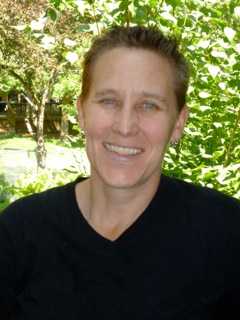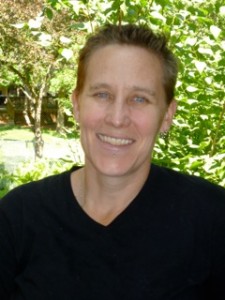Wrestling with the “White” Part…A Life-Giving Feminist Challenge – by Jennifer Harvey
If you’re a Christian who believes justice is an important part of your relationship to the divine, then you’d probably say you value diversity. I would too. You’ve probably also nodded when you’ve heard the idea that faith communities should seek interracial reconciliation. So have I.
These longings for diversity and reconciliation show up in many Protestant contexts: sermons, denominational curricula, formal resolutions. And yet diversity and reconciliation are still sorely lacking in most churches. How many times have you heard a Christian claim that “11 o’clock on Sunday morning remains the most segregated hour of the week”? Statistics suggest it’s still true.
So, what’s the problem? How can such values be so often on Christian lips, while real racial separation (if congregational demographics are considered evidence of such) remains the norm?
Well, try these two exercises.
Write down your racial identity on a piece of paper. Then, describe as many characteristics of your racial identity as you can. Things you affirm or celebrate. (Anything that comes from an unjust privilege or inequitable is not allowed to be on the list.)
I’m willing to bet that if you are a person of color you didn’t struggle too much with this exercise. If you are white, I bet you did. Maybe it made you uncomfortable. Maybe you tried to find positive things you could say about your ethnic heritage—but for most of you this felt vague and distant. Probably you felt disoriented.
Now try this one. Imagine a group of African American students walking across a college campus carrying signs saying “Black if Beautiful!” Imagine a group of Latino/a students carrying signs saying “La Fuerza Latino/a!” What feelings do these images elicit? Now, imagine a group of white students carrying signs reading “White is Beautiful!” Radically different feelings emerge, don’t they?
Whiteness is a problem and it’s a problem white Christians must wrestle with head on. To value diversity means to affirm difference. But these exercises make clear that affirming “whiteness” is a problem. Meanwhile, reconciliation implies we bring our whole selves to the table for authentic relationship. But how is racial reconciliation possible if large numbers of those needing to be reconciled aren’t even clear about what the “white” part means?
Diversity and reconciliation are simply unequipped to help us with the moral dilemmas that are part of the racial category “white.” But feminism can help us here, because it gives us the basic understanding that the personal and political are intertwined.
“White” is a social category that has never been morally neutral in the U.S. In fact, its origins here were part and parcel of the establishment of the enslavement of people of African descent and the genocide and dispossession of Native peoples. People of European descent began to call themselves “white” in 1690, says historian Winthrop Jordan. Packed in were assumptions about superiority—“proven” through religion and science—that supported different legal treatment of those deemed white and those deemed not. Oppression gave “white” its meaning.
Now, oppression gave “black” meaning too but here’s the moral rub. Through centuries of individual and collective disruption and challenge of the claims made about “black,” and activism against the political and legal structures that enforced inhumane treatment, people of African descent created “Black.” Racism is of course still a significant part of the Black experience, but blackness is something African Americans can affirm and celebrate as a result of this ongoing moral agency.
Historical details differ, but similar processes can be seen in relation to the experience of any other community of color on this landbase as well.
But, whites have historically chosen a different path. As white supremacy gave meaning to “white,” most light-skinned people complied: some more actively than others, some to greater benefit than others, but never have we seen an ongoing collective disruption and challenge of the claims made about “white,” nor sustained group activism against the legal structures that make the experiences of whites so different than our brothers and sisters of color. (Even white participation in the Civil Right Movement didn’t do this, because as soon as Black power entered the scene talking about repentance and repair by white oppressors, white Christian participation in the struggle for racial justice evaporated.)
The personal is political.
I don’t mean to induce despair. In fact, a feminist frame enables us to wrestle with whiteness itself in ways that are hopeful and offer a path for transformation. Here’s the key: white people can also choose ongoing disruptive resistance to the structures that make “white” such a problem, create unhelpful “white guilt,” and render our appeals to diversity so insufficient.
Feminism also insists we take our particular experiences seriously if we are to do good ethical and theological work! I cannot cease to “be white,” nor should I ever deny or ignore the social meanings of my light-skin. But, by challenging the structures that give my whiteness such morally compromised meanings, I can paradoxically “be white” (acknowledging these meanings) while refusing to “be white” (to passively acquiesce to these meanings thus letting white be defined by racial oppression). When I refuse to passively accept anymore that my children find police officers to be “safe,” while children of color have to be kept “safe from” them; when I stand in long-term, active and committed solidarity with African American and Latino/a communities against the devastation the prison industrial complex is wreaking on their communities; when I challenge my faith community to stop wondering why our church is “so white” and instead to learn about the history of race in the U.S. and use that knowledge to get involved in justice struggles in my local community, I am being white while refusing to be white.
Such actions, if done well, not only stand to create more racially justice communities. They also stand to transform those of us who are “white” personally. We can learn that even though we live in the “not yet,” in which unjust racial privilege continues to morally malform and dehumanize us, we are not powerless. We can say a loud and resounding “no!” to such moral compromise.
This is not a paradigm of reconciliation. It’s a paradigm of reparation. Wrestling with “whiteness” in a posture of political activist commitment is hope-giving activity to which I believe white Christians are called today. I long for communities of robust diversity in which authentic relationship and reconciliation are lived across beautiful lines of difference. But it’s only through repentance (turning away!) from and repair of harmful social structures that perhaps, someday—just maybe—authentic racial reconciliation might come to be.
Jennifer Harvey is a writer and Associate Professor of Religion at Drake University. She is interested in how social structures shape who we are and how we can transform ourselves into people who create more just compassionate social structures. She is particularly passionate about matters of racial justice and the problem of whiteness, as well as queer and lgbt life in contemporary religious contexts. She is the author of Whiteness and Morality: Pursuing Racial Justice through Reparations and Sovereignty (Palgrave Macmillan, 2007) and a co-editor of Disrupting White Supremacy: White People on What We Need To Do (Pilgrim Press, 2004) and numerous other articles. She is an ordained minister in the American Baptist Churches (U.S.A.). You can follow her blog at http://livingformations.tumblr.com.


